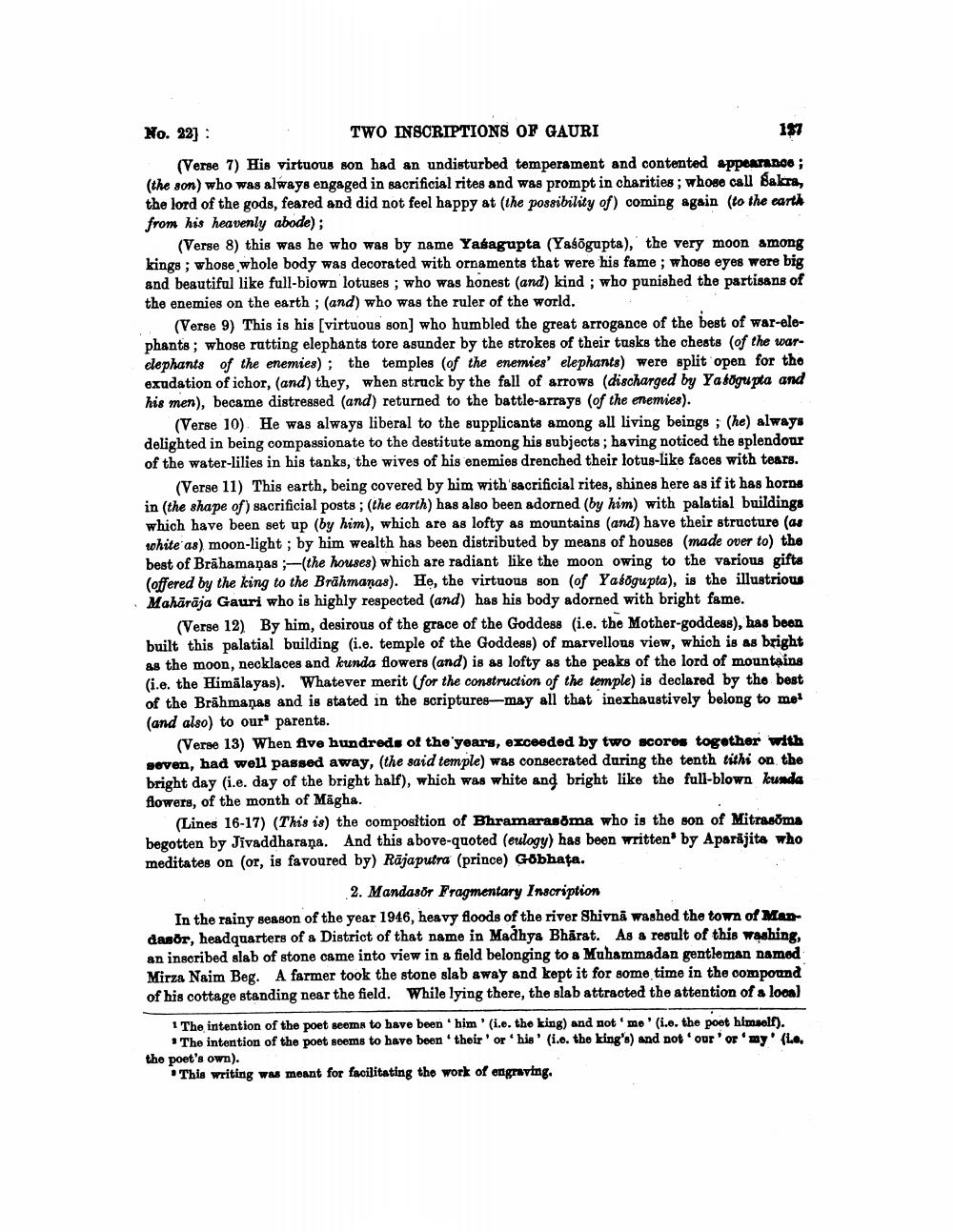________________
No. 22] : TWO INSCRIPTIONS OF GAURI
187 (Verse 7) His virtuous son had an undisturbed temperament and contented appearanoO; (the son) who was always engaged in sacrificial rites and was prompt in charities; whose call Bakra, the lord of the gods, feared and did not feel happy at the possibility of) coming again (to the earth from his heavenly abode);
(Verse 8) this was he who was by name Yasagupta (Yasögupta), the very moon among kings; whose whole body was decorated with ornaments that were his fame ; whose eyes were big and beautiful like full-blown lotuses; who was honest (and) kind; who punished the partisans of the enemies on the earth ; (and) who was the ruler of the world.
(Verse 9) This is his (virtuous son] who humbled the great arrogance of the best of war-elephants; whose rutting elephants tore asunder by the strokes of their tusks the chests (of the warclephants of the enemies); the temples (of the enemies' elephants) were split open for the exudation of ichor, (and) they, when struck by the fall of arrows (discharged by Yatogupta and his men), became distressed (and) returned to the battle-arrays (of the enemies).
(Verse 10) He was always liberal to the supplicants among all living beings; (he) always delighted in being compassionate to the destitute among his subjects ; having noticed the splendour of the water-lilies in his tanks, the wives of his enemies drenched their lotus-like faces with tears.
(Verse 11) This earth, being covered by him with sacrificial rites, shines here as if it has horns in the shape of sacrificial posts; (the earth) has also been adorned (by him) with palatial buildings which have been set up (by him), which are as lofty as mountains (and) have their structure (as white as) moon-light; by him wealth has been distributed by means of houses (made over to the best of Brähamaņas ;-(the houses) which are radiant like the moon owing to the various gifts (offered by the king to the Brāhmanas). He, the virtuous son (of Yasögupta), is the illustrious Mahārāja Gauri who is highly respected (and) has his body adorned with bright fame.
(Verse 12). By him, desirous of the grace of the Goddess (i.e. the Mother-goddess), has been built this palatial building (i.e. temple of the Goddess) of marvellous view, which is as bright as the moon, necklaces and kunda flowers (and) is as lofty as the peaks of the lord of mountains (i.e. the Himalayas). Whatever merit (for the construction of the temple) is declared by the best of the Brāhmaṇas and is stated in the scriptures-may all that inexhaustively belong to me (and also) to our parents.
(Verse 13) When five hundreds of the years, exceeded by two scores together with soven, had well passed away, (the said temple) W88 consecrated during the tenth tithi on the bright day (i.e. day of the bright half), which was white and bright like the full-blown kunda flowers, of the month of Māgha.
(Lines 16-17) (This is) the composition of Bhramarasoma who is the son of Mitrasoma begotten by Jivaddharana. And this above-quoted (eulogy) has been written by Aparajita who meditates on (or, is favoured by) Rājaputra (prince) Gobhata.
2. Mandasor Fragmentary Inscription In the rainy season of the year 1946, heavy floods of the river Shivna washed the town of Man dasör, headquarters of a District of that name in Madhya Bharat. As a result of this washing, an inscribed slab of stone came into view in a field belonging to a Muhammadan gentleman named Mirza Naim Beg. A farmer took the stone slab away and kept it for some time in the compound of his cottage standing near the field. While lying there, the slab attracted the attention of a local
1 The intention of the poet seems to have been him 'i.e. the king) and not me' i.e. the poet himself).
* The intention of the poet soems to have been their or his' (ie the king's) and not our ormy. (Le. the poet's own).
This writing was meant for facilitating the work of engraving.




